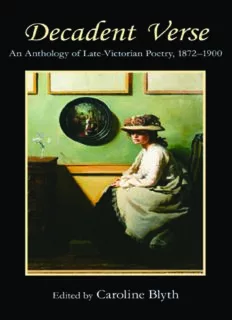
Decadent Verse: An Anthology of Late-Victorian Poetry, 1872-1900 PDF
Preview Decadent Verse: An Anthology of Late-Victorian Poetry, 1872-1900
Decadent Verse An Anthology of Late Victorian Poetry,1872–1900 Caroline Blyth teaches English at Royal Holloway,University of London and is a Visiting Fellow of St Edmund’s College,Cambridge.She edited Critical Quarterly:The Making of the Reader (Blackwells,2003).She was previously Fellow and Director of Studies at St Edmund’s College, Cambridge, and held a Newton Trust Fellowship and a British Academy Postdoctoral Fellowship in the Faculty of English. John Lane’s Bookshop Decadent Verse An Anthology of Late Victorian Poetry, 1872–1900 Edited and with an Introduction by Caroline Blyth Anthem Press An imprint of Wimbledon Publishing Company www.anthempress.com This edition first published in UK and USA 2009 by ANTHEM PRESS 75–76 Blackfriars Road,London SE1 8HA,UK or PO Box 9779,London SW19 7ZG,UK and 244 Madison Ave.#116,New York,NY 10016,USA Introduction,editorial matter and selection © 2009 Caroline Blyth The moral right of the authors has been asserted. All rights reserved.Without limiting the rights under copyright reserved above, no part of this publication may be reproduced,stored or introduced into a retrieval system,or transmitted,in any form or by any means (electronic,mechanical,photocopying,recording or otherwise), without the prior written permission of both the copyright owner and the above publisher of this book. The publishers have made every attempt to respect due copyrights for the work within this collection.Should there be any issues regarding this matter, please contact Anthem Press at the address above. British Library Cataloguing in Publication Data A catalogue record for this book is available from the British Library. Library of Congress Cataloging in Publication Data A catalogue record for this book has been requested. ISBN-10:1 84331 302 2 (Hbk) ISBN-13:978 1 84331 302 1 (Hbk) ISBN-10:1 84331 317 0 (Ebk) ISBN-13:978 1 84331 317 5 (Ebk) 1 3 5 7 9 10 8 6 4 2 The illustration on the cover is ‘The Mirror’(1900),by Sir William Orpen,reproduced by permission of the Tate.The illustration on page 35 is ‘Queen Victoria’(1899),by Benjamin Constant, reproduced by permission of The Royal Collection © 2008 Her Majesty Queen Elizabeth II. Printed in United Kingdom In memoriam PAT The feeling of strangeness that overcomes the actor before the camera is basically of the same kind of estrangement felt before one’s own image in the mirror. Walter Benjamin, The Work of Art in the Age of Mechanical Reproduction It is in a way like St Paul’s ‘groanings which cannot be uttered’ [...] It is what I have always felt even from a boy,and what as a boy I called ‘the passion of the past’.And it is so always with me now;it is the distance that charms me in the landscape, the picture and the past,and not the immediate today in which I move. Tennyson at Aldworth, quoted by Sir James Knowles The old pre-industrial community and culture are gone,and cannot be brought back.Nor is it desirable that they should be. They were too unjust, too squalid, and too custom-bound. Virtues which were once nursed unconsciously by the forces of nature must now be recovered and fostered by a deliberate effort of the will and the intelligence.In the future,societies will not grow of themselves. They will either be made consciously or decay. W. H. Auden, The Oxford Book of Light Verse Though the great song return no more There’s keen delight in what we have: The rattle of pebbles on the shore Under the receding wave. W.B. Yeats, ‘The Nineteenth Century and After’ Contents Preface xxxv Acknowledgements xli Decadent Art 1872–1900 xliii Introduction 1 (I) The Politics of Poetry 1 (II) Versifications 12 (III) Fictions of Empire and the City 23 (IV) 1900:Turn off the Century 32 Comparative Prose 1872–1900 49 Proem:The Way We Live Now 53 (i) John Addington Symonds (1840–1893) 53 The Camera Obscura (ii) Joseph Skipsey (1832–1903) 53 ‘Get Up!’ (iii) Alice Meynell (1847–1922) 54 Song of the Night at Daybreak (iv) Robert Louis Stevenson (1850–1894) 54 ‘The morning drum-call on my eager ear’ (v) Louisa S.Guggenberger (formerly Bevington) (1845–1895) 54 Afternoon (vi) Robert Bridges (1844–1930) 55 ‘The evening darkens over’ (vii) Thomas Hardy (1840–1928) 56 I Look Into My Glass (viii) Rosamund Marriott Watson (1860–1911) 56 Aubade (ix) A.Mary F.Robinson (1857–1944) 57 Twilight (x) Mathilde Blind (1841–1896) 58 The Red Sunsets,1883 (xi) William Renton (fl.1852–post 1905) 59 After Nightfall (xii) Gerard Manley Hopkins (1836–1904) 59 Moonrise William Frederick Stevenson (fl.1883) 59 1. Life and Impellance 59 2. A Planet of Descendance 60
Description: